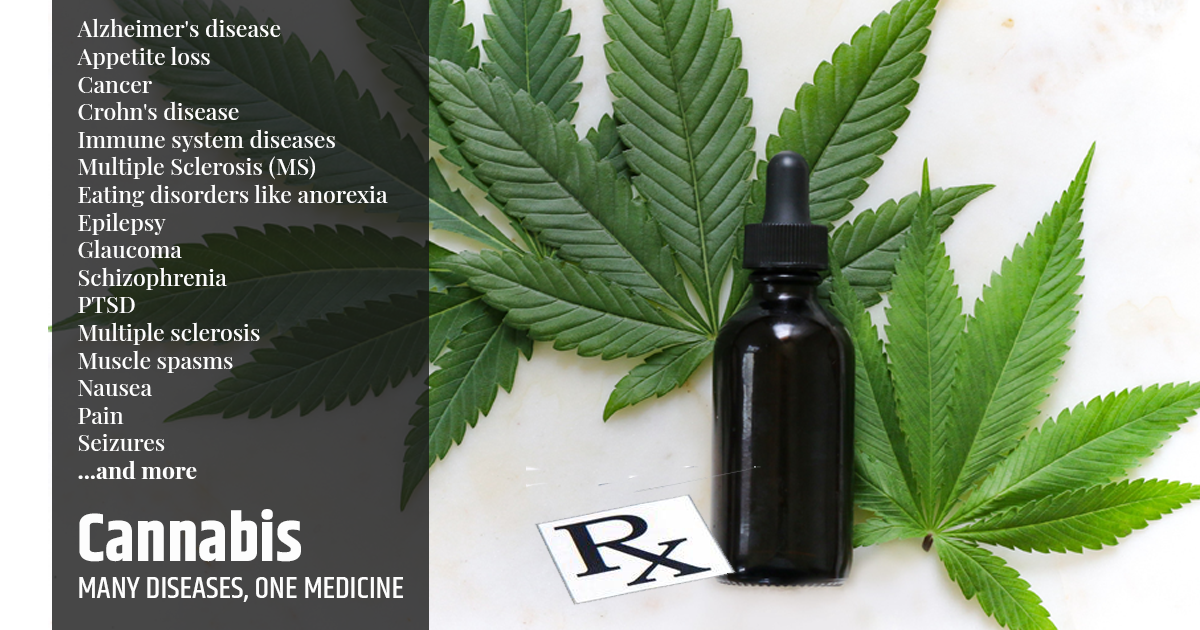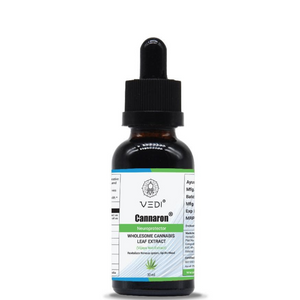A Complete and Definitive Guide to Medical Cannabis: Everything you need to know about Cannabis dosing and use for various diseases and symptoms

Table of Content
- What is Cannabis?
- What are endocannabinoids and phytocannabinoids?
- Endocannabinoid System (ECS) and it’s working
- What are CBD and THC?
- Understanding important terms
- Marijuana
- Medical Marijuana or Medical Cannabis
- Hash Oil
- Hemp Oil or Hemp Seed Oil
- CBD Oil
- Cannabis Oil or Marijuana Oil or THC Oil
- Cannabis Medicines to treat diseases and symptoms
- Cancer
- Heart Disease
- Pain
- Diabetes
- Treating Anxiety Disorders
- Multiple Sclerosis (MS)
- Insomnia
- Colitis
- Appetite
- Parkinson's Disease
- Alzheimer's
- Epilepsy
- Glaucoma
- Muscle Spasm
- Fibromyalgia (FM)
- Lungs
- COVID
- Best practices for taking Medical Cannabis
- How and where to buy in India?
Cannabis products are becoming increasingly popular, with the acceptance of their treatment in clinical settings. Positive clinical evidence and reformed laws have supported this much-needed change.
However, there is a lot of prevalent misinformation and a lack of knowledge about the usage of medical cannabis. This article is designed to be a simple yet thorough guide to understand the incredible potential of cannabis medicines.
What is Cannabis?
Cannabis is a genus of flowering plants in the family Cannabaceae with fragrant buds. Broadly there are two species or strains within the genus, Cannabis Sativa and Cannabis Indica. Both of them have similar characteristics with specific and distinct differences.
Historical evidence suggests that Indica has more sedating, relaxing, pain-relieving & calming properties, while Sativa has more uplifting, energizing, and neuroprotective traits. Some of the recent research has shown that at present, finding a pure Sativa or Indica species is very difficult, due to hybridization, so the cannabinoids such as CBD & THC serve as good indicators to know the effects and properties of the various strains. The Indica traits are evidenced more in the CBD dominant varieties, whereas the Sativa traits are exhibited in the THC dominant varieties.
One more indicator to find out these traits is by testing the terpene profile of the cannabis varieties. They are aromatic compounds found in many plants, but cannabis plants contain high concentrations of them. These compounds create the characteristic scent of many plants such as pine, lavender, mango, orange, etc. So, if the cannabis has a mango fragrance, it will be more sedating or relaxing, giving it the Indica effect. Whereas, if the cannabis has a lemon fragrance, it will be more energetic, giving it a Sativa effect.
What are endocannabinoids and phytocannabinoids?
Endocannabinoids are produced inside our bodies, whereas Phytocannabinoids are plant-derived. The prefix “Phyto” signifies that they are plant-derived, while “Endo” reveals the endogenous nature of the latter.
1. Endocannabinoids
Endocannabinoids are naturally occurring endogenous lipids or fatty acids produced in our bodies that interact with cannabinoid receptors. They are the neurotransmitter produced in the brain that binds to receptors in the brain and body.
When endocannabinoids bind with the cannabinoid receptors (such as CB1 and CB2), they regulate almost all physiological and cognitive processes such as appetite, mood, memory, muscle movement, thermoregulation, and brain reward systems.
2. Phytocannabinoids
If your body is producing enough endocannabinoids, then it is in balance and under an ideal state. But sometimes, the body doesn’t function the way it is supposed to, due to various internal and external factors and suffers from cannabinoid deficiency. It then requires supplementation of phytocannabinoids from an external source.
Phytocannabinoids are naturally occurring cannabinoids found in the Cannabis plant, and there are more than 150 reported to be found naturally in the Cannabis plant. Yes, over 150!
Endocannabinoid System (ECS) and its working
“The endocannabinoid system is very important. Almost all illnesses we have are linked to it in some way or another. And that is very strange.” – Dr. Raphael Mechoulam, known as “the father of cannabis research.”
The ECS is a collection of neuromodulators (endocannabinoids), their receptors (CB1 & CB2), and signaling pathways in our body. It is a self-regulating biological system in the human body.
Endocannabinoids are neurotransmitters that bind with cannabinoid receptors throughout our bodies including the central nervous system, peripheral nervous system, and immune system. Our bodies consist of receptors that have an affinity to bind with cannabinoids like CBD (Cannabidiol), THC (Delta-9-tetrahydrocannabinol), CBN, CBC, CBG, etc.
When a patient takes cannabinoids, they interact with our already existing ECS. The fact is that these compounds are already a part of us, and although these cannabinoids are supplemented by plants, they are quite similar to the ones that exist in our bodies.
Cannabis works in two ways, one by maintaining the ECS tone and secondly by complementing if there is a deficiency. Low Cannabinoid tone indicates an imbalance.
Read about ECS and emotions here.
What are CBD and THC?
Cannabidiol (CBD) and Δ9-tetrahydrocannabinol (THC) are the two main chemical components of many different phytocannabinoids present in cannabis.
According to studies, THC, the highly potent and abundant cannabinoid, exerts a wide variety of biological effects by mimicking endogenous substances – the endocannabinoids – that bind to and activate receptors CB1 and CB2. THC is the compound that produces an intoxicating or high effect in humans.
Whereas CBD is non-intoxicating and it balances some side-effects of using higher doses of THC, such as anxiety, heart palpitations, etc., and provides several therapeutic effects. Both of these compounds, along with the various other cannabinoids and other plant compounds, have their own roles to play, offering incredible holistic health benefits and relief to symptoms.
All the cannabinoids together, also known as a wholesome or full-spectrum medicine, provide optimal benefits, scientifically known as the ‘entourage effect’, where CBD and THC, other phytocannabinoids and terpenes work together synergistically to provide a more holistic approach to treatment, as nature intended, providing improved results.
Understanding important terms
- Marijuana
Pronounced as “marihuana”, it is a non-scientific slang term for cannabis, composed of the cured flowers of the female plant in the genus cannabis. The term marijuana is sometimes used interchangeably with cannabis. It is usually dried and crushed to be added to food or for smoking.
- Medical Marijuana or Medical Cannabis
Medical cannabis, or medical marijuana (MMJ), is cannabis prescribed by physicians for their patients to treat certain conditions or disorders. It is a plant-based medicine obtained from the Cannabis Sativa or Cannabis Indica species. It comes in various forms, such as flowers, tinctures, extracts, capsules, etc.
- Hash Oil
Hashish, often known as "hash", is a cannabis product composed of compressed or purified preparations of stalked resin glands called trichomes. It is said to be the most potent form of cannabis due to higher THC, therefore required in lesser quantities. Hash oil can contain about 90% THC.
- Hempseed Oil
The oil is extracted from seeds of the hemp plant through cold-pressing. The seeds have a rich profile of nutrients, fatty acids, and useful bioactive compounds that can also have health benefits. Hempseed oil is an important ingredient in many of nutritional and skincare products.
Products derived from the seeds of hemp plant are unlikely to create a “high” and are mainly used for nutritional or beauty purposes.
- CBD Oil
CBD oil available in the market may be full-spectrum or may be made just with CBD isolates. Some products are made using the whole plant, using the stalks, leaves, and flowers of the hemp plant. Whereas, some products are made only using the stalks of the hemp plant, which is not advisable to be used for edible purposes, as the CBD content in the stalk is too low, and it is better to use them for fibers, hempcrete, etc.
CBD oils contain a higher concentration of CBD and a very low percentage of THC. You might find many CBD oils in the market which contain just the isolated CBD in them, and do not contain any other cannabinoid or terpene, hence lacking the ‘entourage effect’ explained above under the “What are CBD & THC?” section.
- Cannabis Oil
Derived from cannabis leaves and/ or flowers, these oils contain a full spectrum of cannabinoids and terpenes, thereby providing an ‘entourage effect’. Understand the what, why, and how of Cannabis oil here.
Many manufacturers and marketers label their products CBD oil instead of "cannabis oil" to attract more customers. Therefore, we need to ask if they are using CBD isolates or full-spectrum oil in their products and choose reliable labels as per an individual need.
Cannabis Medicines to treat diseases and symptoms
Cannabis in India is gaining popularity with its huge medicinal potential as ingrained in the Indian Ayurveda and Atharvaveda system. Cannabis has been known to promote overall well-being, by treating diseases and symptoms.
Cannabis impacts all physiological and biochemical systems, including the immune, renal, endocrine, cardiopulmonary/ respiratory, reproductive, and central nervous systems, as well as genetics and general health.
Here is a list of diseases/ disorders with proven benefits from cannabis medicines –
- Cancer
Since 1970, cannabis has been known to exert palliative effects in cancer patients, including effects like inhibiting chemotherapy-induced nausea and vomiting, appetite stimulation, and pain inhibition. Read more about How Cannabis helps manage nausea and vomiting in cancer patients here.
Along with its palliative effects, it has antiproliferative, antitumoral, and pro-apoptotic effects that inhibit cancer cell migration, adhesion, and invasion. Studies suggest that in cancer patients, cannabinoids can lead to the inhibition of cell proliferation, invasion, and induction of apoptosis in cancer cell lines resulting in the reduction of the tumor without overt psychoactive effects. Growing evidence demonstrates cannabinoids are effective inhibitors of multiple types of cancer.
- Heart Disease
Cannabidiol (CBD), one of the active components in cannabis, exerts a wide variety of effects, including anti-apoptotic, anti-inflammatory, and antioxidant properties. Studies suggest that Cannabis exerts a tissue-sparing effect during chronic myocardial ischemia and acute reperfusion (I/R).
Myocardial ischemia occurs when blood flow to the heart muscle (myocardium) is obstructed by a partial or complete blockage of coronary arteries by build-up of plaques (atherosclerosis). CBD acts as a cardioprotective drug.
- Pain
There is substantial evidence that Cannabis is an effective treatment for chronic pain. It acts as an anticonvulsant, muscle relaxant and treats restlessness & anxiety in terminal illnesses.
Cannabinoids produce analgesia by acting on multiple pain targets within the peripheral and CNS, through the activation of CB1 and CB2 receptors. They reduce chronic body pain through interaction with cannabinoid receptors.
Cannabis is being used to treat Tourette’s indications, including inflammation, neuralgia, migraine, and dysmenorrhea.
- Diabetes
Cannabidiol (CBD) and D9-tetrahydrocannabivarin (THCV) are non-intoxicating phyto-cannabinoids affecting lipid and glucose metabolism. Studies suggest that THCV and CBD decreased blood glucose levels and increased insulin production in people with type 2 diabetes.
- Treating Anxiety Disorders
Cannabis has the potential as an adjunct to therapies for anxiety disorders and can help treat a range of anxiety disorders, including generalized anxiety disorder (GAD), phobias, panic disorder, and social anxiety disorder.
Evidence from human studies strongly supports the anxiolytic (anti-anxiety), panicolytic, and anti-compulsive effects of CBD and THC, which are beneficial in alleviating anxiety. Read more about how Cannabis works to treat anxiety and stress here.
- Multiple Sclerosis (MS)
Nabiximols is a cannabinoid-based medicine that can be used by patients with moderate to severe multiple sclerosis spasticity (MSS). Cannabis reduces muscle stiffness, spasm, and pain in MS patients. Real-life data confirm cannabis as an effective and well-tolerated treatment option for resistant MSS in clinical practice.
- Insomnia
Cannabis affects the release of cortisol and acts as a sedative. Patients treated with CBD had a prompt and substantial reduction in the frequency of RBD-related events without side effects, as suggested by research.
Therapeutically, Cannabis consumption increases sleep duration, alleviates primary symptoms such as pain and anxiety, which are associated with sleep disturbances. Read more on using medicinal Cannabis to improve sleep and treat insomnia.
- Colitis
Within gastroenterology, Cannabis has been used to treat abdominal pain, anorexia, Crohn’s disease, ulcerative colitis, emesis, gastroenteritis, diarrhea, intestinal inflammation, and diabetic gastroparesis.
A recent survey supports the traditional view that Cannabis provides benefits in disturbances of the gastrointestinal tract. Cannabis has potent anti-inflammatory, antiemetic, appetite-stimulating, and antidiarrheal effects.
- Appetite
Researchers have found that Cannabis intake can stimulate appetite. When the stomach is empty, it releases a hormone called ghrelin, sending a message to the brain. A dose of Cannabis triggers a ghrelin surge, hence improving appetite.
The appetite-stimulating properties of Cannabis assist by overcoming the neurobiological issues that are also intimately involved with their eating disorder.
- Parkinson's Disease
Medical cannabis was found to improve symptoms of Parkinson's Disease in the initial stages of treatment. Studies suggest that patients felt significant improvement in sleep and pain scores while under cannabis treatment.
- Alzheimer's
Medical cannabis has drawn significant attention among researchers due to its potential neuroprotective effects. A 2015 study from Israel shows the medical cannabis oil containing THC could be vital in the treatment of Alzheimer’s disease.
- Epilepsy
Epilepsy patients using medicinal marijuana reported that the drug is very effective for their seizure control and mood disorders. According to the studies, patients said that Cannabidiol/ CBD improved their seizure frequency and severity while fixing their mood disorders.
- Glaucoma
Cannabis has the potential of becoming a useful treatment for glaucoma, as they seem to have neuroprotective properties and effectively reduce intraocular pressure. Cannabinoid receptors are found in the trabecular meshwork, non-pigmented ciliary epithelium, and ciliary muscle of human eyes.
Research suggests that Cannabis with THC can lower IOP in 60% to 65% of both normal individuals and patients with glaucoma. Intraocular pressure (IOP) is the fluid pressure inside the eye, which is an important aspect in the evaluation of patients at risk of glaucoma.
- Muscle Spasm
Cannabis has been demonstrated to be effective in alleviating impaired bladder control, muscle spasms, and spasticity. Studies found that cannabinoids such as THC bind with cannabinoid receptors of the human body to reduce the levels of inflammatory proteins and suppress the spasm response. Different THC/CBD combination therapies decrease muscle spasticity and suppress neuroinflammation.
- Fibromyalgia (FM)
FM is a pain syndrome with multiple etiologies, central sensitization, altered stress response, pro-inflammatory state, abnormal activity of neurotransmitters, small-fiber peripheral neuropathy, and genetic predisposition. Research suggests that Cannabis can reduce these symptoms in different ways with its anti-epileptic, analgesic, anxiolytic, and sedative effects.
- Lungs
The use of Cannabis as a therapeutic agent for respiratory symptoms is rare, but few studies recommend using the Cannabis vaporizer to minimize respiratory complaints. This machine heats the plant to release cannabinoids in a mist without smoke and other respiratory irritants. Read here to know how Cannabis acts as a bronchodilator and makes breathing easier for people with asthma.
- COVID
Coronavirus impacts the respiratory system much deeper and causes coagulation. Cannabis has anti-inflammatory properties and can act as a vasorelaxant. Clinical trials suggest that whole-plant Cannabis extracts high in CBD can reduce blood coagulation and can be used to counter SARS-CoV-2 infections by quelling the cytokine storm.
In addition to the above-mentioned diseases, Cannabis medicines have also been proven effective for diseases like seizures, wasting syndrome (cachexia), mood disorders, such as ADD or ADHD, allergies, immunity, psoriasis, autism, Tourette’s, PTSD disorders, and migraine.
Best practices for taking Medical Cannabis
- Cannabis Medicines Consumption
Medical cannabis products such as cannabis oil, cannabis-infused medicines and dietary supplements, hemp oil extract, etc., work tremendously well in alleviating ailments as described above. Cannabis medicines in India are available in the form of capsules and oils.
- Dosage
Dosage is the vital factor to reap maximum benefits with minimal side effects of cannabis medicines. Vedi Herbals invests a lot in researching cannabis and improving awareness around it to make it a more safe, versatile, and effective drug. Read here to understand the optimal Cannabis dosing.
It is advisable to start with a low dose, as dosage varies with each person and there are other factors involved too, such as the state of disease, age, etc. It is best to follow a physician’s advice to find the correct dose and treatment protocol.
Talk to Vedi doctors and get professional medical advice to help uncover the root cause of your medical or health issues and achieve mental, physical and spiritual health.
- Side Effects
Cannabis medicines are likely to be safe in low doses. Some reported side effects of Cannabis when used for a long duration or in higher doses include:
- Dry mouth
- Decrease in blood pressure
- Increased heartbeat
- Decreased concentration levels
- Drowsiness
- Drug Interactions:
Cannabis medicines are likely safe and can be taken with most drugs. However, it is best to consult your doctor before starting and sharing the list of all medications to learn more about drug interactions.
Cannabis can accelerate or inhibit the effects of other drugs, especially the ones that cause drowsiness, including antidepressants, antihistamines, sedatives, seizure medicines, pain relievers, anxiety medicines, muscle relaxants, and alcohol.
Health Canada suggests the risk/benefit ratio of cannabis should be carefully and individually evaluated, especially for people who:
- Are under 18
- Have hypersensitivity to any cannabinoid
- Have severe cardio-pulmonary disease with hypotension/ hypertension/ syncope or tachycardia
- Have a family history of schizophrenia
- Have severe respiratory diseases such as chronic obstructive pulmonary disease (COPD)
- Women who are planning pregnancy, or are pregnant, or breastfeeding.
How and where to buy in India?
Cannabis medicines are available in India. HempCann Solutions is the leading research and manufacturing company of Cannabis in India.
Vedi opened the first Medical Cannabis clinic in India in Koramangala, Bangalore. Vedi Wellness Centre provides Ayurvedic doctor consultation, nutritional counseling, ayurvedic medicines, herbal supplements and natural body care products. We are operational online too, @www.vediherbals.com.
Vedi uses the best quality ayurvedic herbs, including cannabis leaves to make its 100% vegetarian Ayurvedic medicines. Since cannabis has no known toxicity (unlike pharma drugs like NSAIDs), it is safe as well as healthy. These medicines are free from harmful chemicals, artificial flavors or sweeteners, gluten, soy, pesticides, and heavy metals.
Medical Cannabis - Holistic Ayurvedic Medicine
Medical cannabis, a potential panacea for holistic healing, is now backed by innumerable studies and research, reinforcing its therapeutic benefits. Therefore, the acceptance and consumption of medicinal cannabis in India are also progressing rapidly. We encourage you to talk to our doctors and find out how to avail the benefits of medical cannabis.







